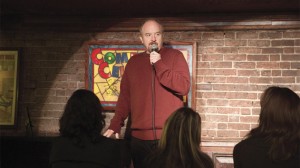In the war zone that is the fall TV season, it’s important to pick out the gems hidden in the media mesh. Each week, A&E columnist Sebastian Torrelio will profile one new show and one returning show that share a connection, detailing how they may make those after-school hours more meaningful.
The present day’s “Golden Age of Television” centers around freedom of expression, especially for creators. In the early 2000s, cable and paid-access networks started giving showrunners more freedom in all aspects of their projects, from the writing to the editing room.
Comedy has taken advantage of that, primarily through two individuals, Lena Dunham on HBO and Louis C.K. on FX. These two are pushing the standards of how the television format works.
It’s only natural that Netflix wants to join the ring of programs centered around independent voices. The decision it’s made to give Aziz Ansari a new series, “Master of None,” which debuted its full 10-episode season on Friday, is genius.
Ansari, known for his role as the womanizing Tom Haverford on “Parks and Recreation,” has an outspoken comedic sensibility that commands attention. Like many shows today that push the envelope on what a sitcom can and should mean, “Master of None” doesn’t follow a strict plot, but rather allows Ansari’s character Dev to stroll through life, apparently without many pressing troubles.
Dev is, at least in the beginning of the series, enjoying life while watching those around him collapse. Some of his old flings or classmates have children now and are getting torn to shreds as a result. His single friends, though generally happier, are still depressingly simple sometimes.
The most impactful criticism about Dev’s life is made by his parents, intrepidly cast as Ansari’s real-life parents Shoukath and Fatima. They note how Dev, like Ansari, is a first-generation American, and that their efforts to achievement fulfillment for their son were painstaking and arduous. Now, Dev gets to waste his parents’ legacy by watching terrible movies with his friends and hanging out with his newest romantic interest Rachel (Noël Wells).
“Master of None” is a series that tackles race in a fundamentally reputable way. Ansari doesn’t explicitly comment on how his heritage brings about highs and lows – his heritage just is his life. Sometimes it affects his career and relationship with his parents, but no more so than the rest of his culturally diverse acquaintances.
It should be noted that Louis C.K. is also a first-generation American, but on his show “Louie,” he doesn’t really talk about that. The show is incredible because of its entirely different way of looking at life. Anyone who isn’t already familiar with it may find the journey more disturbing than laugh-out-loud funny, though it’s really both.

“Louie” analyzes the life of a loosely fictionalized Louis C.K. Like the real-life counterpart, Louie is a divorced New York stand-up comedian with two daughters, a host of celebrity friends and an even greater host of grating troubles. It may seem like Louie is going insane on an episodic basis, but “Louie” is a show that isn’t afraid of pointing out the depressing circumstances of life and malicious intents of average people.
Over the course of five seasons, “Louie” has taken a turn from exploiting the darkest recesses of the human mind to more of a late-night talk show-esque denunciation of life. That’s a pressing characteristic of C.K.’s schtick: He’s overly obsessed with death, whereas Ansari’s show so far is having a whole lot of fun with everyday existence.
This doesn’t make either show’s social commentary less meaningful, but it goes to show that in today’s TV landscape, there’s room for brilliant television creators to take their own lead. Every generation needs a voice, and it’s extremely fortunate that ours has so many.
What television show have you been watching lately? Email Torrelio at storrelio@media.ucla.edu.
